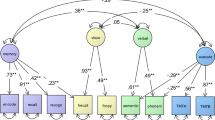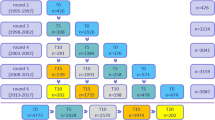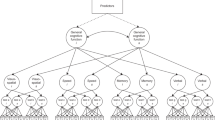Abstract
Key proteins implicated in the development of Alzheimer's disease are the β-amyloid precursor protein, which gives rise to the β-amyloid peptides that accumulate in the deteriorating brain1,2, and the different isoforms of apolipoprotein E (apoE). The apoE4 variant increases the risk of developing the disease compared with apoE3 (ref. 3). We have tested the spatial memory of transgenic mice carrying human forms of these proteins and find that it is impaired in mice with apoE4 but not those with apoE3, even though the levels of β-amyloid in their brains are comparable. The fact that apoE3, but not apoE4, can protect against cognitive deficits induced by β-amyloid may explain why human apoE4 carriers are at greater risk of developing Alzheimer's than apoE3 carriers.
This is a preview of subscription content, access via your institution
Access options
Subscribe to this journal
Receive 51 print issues and online access
$199.00 per year
only $3.90 per issue
Buy this article
- Purchase on Springer Link
- Instant access to full article PDF
Prices may be subject to local taxes which are calculated during checkout

Similar content being viewed by others

References
Wilson, C. A., Doms, R. W. & Lee, V. M.-Y. J. Neuropathol. Exp. Neurol. 58, 787–794 (1999).
Jensen, M. et al. Ann. Neurol. 45, 504– 511 (1999).
Farrer, L. A. et al. J. Am. Med. Assoc. 278, 1349– 1356 (1997).
Johnson-Wood, K. et al. Proc. Natl Acad. Sci. USA 94, 1550– 1555 (1997).
Price, D. L. & Sisodia, S. S. Annu. Rev. Neurosci. 21, 479–505 (1998).
Hsia, A. et al. Proc. Natl Acad. Sci. USA 96, 3228– 3233 (1999).
Raber, J. et al. Proc. Natl Acad. Sci. USA 95, 10914– 10919 (1998).
Buttini, M. et al. J. Neurosci. 19, 4867– 4880 (1999).
Lue, L.-F et al. Am. J. Pathol. 155, 853– 862 (1999).
McLean, C. A. et al. Ann. Neurol. 46, 860– 866 (1999).
Holcomb, L. A. et al. Behav. Genet. 29, 177– 185 (1999).
Lambert, M. P. et al. Proc. Natl Acad. Sci. USA 95, 6448– 6453 (1998).
Hartley, D. M. et al. J. Neurosci. 19, 8876– 8884 (1999).
Author information
Authors and Affiliations
Corresponding author
Rights and permissions
About this article
Cite this article
Raber, J., Wong, D., Yu, GQ. et al. Apolipoprotein E and cognitive performance . Nature 404, 352–354 (2000). https://doi.org/10.1038/35006165
Issue Date:
DOI: https://doi.org/10.1038/35006165
This article is cited by
-
Cell type-specific roles of APOE4 in Alzheimer disease
Nature Reviews Neuroscience (2024)
-
A small-molecule TLR4 antagonist reduced neuroinflammation in female E4FAD mice
Alzheimer's Research & Therapy (2023)
-
Brain integrity is altered by hepatic APOE ε4 in humanized-liver mice
Molecular Psychiatry (2022)
-
Effects of apolipoprotein E isoform, sex, and diet on insulin BBB pharmacokinetics in mice
Scientific Reports (2021)
-
A New Synuclein-Transgenic Mouse Model for Early Parkinson’s Reveals Molecular Features of Preclinical Disease
Molecular Neurobiology (2021)
Comments
By submitting a comment you agree to abide by our Terms and Community Guidelines. If you find something abusive or that does not comply with our terms or guidelines please flag it as inappropriate.


